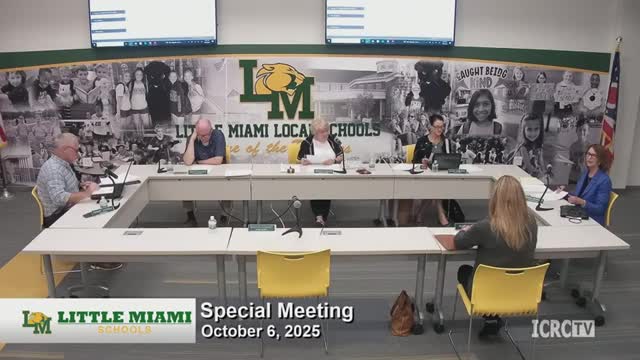Board splits over policy requiring escorts for school visits; background checks and access debated
Get AI-powered insights, summaries, and transcripts
Subscribe
Summary
Board members debated a proposed visitor-access policy that would require board members to sign in and request an escort when visiting schools; some argued escorts protect students and staff comfort while others said elected members should be able to tour unescorted and background-check language should be updated.
The Little Miami School Board debated a proposed visitor-access policy on Oct. 6 that would formalize how board members visit school buildings, including sign-in requirements, escorted tours and background-check language. The proposal appears in policy packet item 3112 (board-staff communications) and would state that "after signing in, board members may request that a building administrator or designated staff member accompany them during their visit." The item remains under discussion and will be considered again on the board’s regular meeting agenda.
Board members expressed sharply different views. "I also feel like we should be escorted through. I feel like that's that's a protocol that, most schools do and and I have I think that that should be our policy," said Diane, a board member who supported escorted visits and said escorting helps teachers and staff feel comfortable. Another board member, Bobby, said he wanted the freedom to walk the building without an escort to take his time and observe: "I would like to take my time, and I like to read what's on the walls. I like to see what's in the classrooms." He said waiting for an available staff member to act as an escort has been a practical obstacle to informal visits.
The draft policy distinguishes volunteers and preauthorized vendors who have passed background checks and may have unescorted access for approved work purposes; several board members said the draft should clarify whether board members must also complete background checks to receive unescorted access. "If we are to be unescorted, I believe we need to have a background check," one board member said during discussion.
Why it matters: the debate frames competing priorities for both school governance and building-level operations. Supporters of escorted visits said escorts protect student privacy and reduce interruptions to teachers’ work; opponents said elected board members need ready access to observe classrooms and facilities and that school staff should plan to provide escorts without undue burden. Board members also noted logistics: principals or front-office staff sometimes have limited availability during the school day to accompany visits.
Discussion, direction and next steps: the policy received a first reading during the special meeting. The board did not vote on the policy during this session; members agreed to place the batch of policies (including this visitor-access policy) on the Oct. 28 regular-meeting agenda for further consideration. Board members also discussed the option of allowing announced and unannounced visits but keeping a sign-in protocol and clarifying escort expectations.
Background and context: the packet language defines a visitor as "any person who is not employed in the building or doing approved work in the building" and allows unescorted access for volunteers and vendors who have passed background checks for approved work purposes. The policy discussion referenced similar practices in other districts and noted the board’s small size (five members) when weighing the operational impact of escorted versus unescorted visits.
